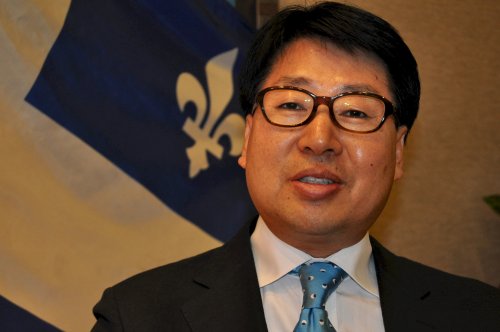Plan Nord is Canadian province’s deal for the future
For some Canadians, the province of Quebec brings back negative memories of a government bent on separation from the country; for others, Quebec is an important, intrinsic part of Canada.
The truth of the matter is that Quebec is Canada’s second most important province pumping out a considerable share of exports and industry.
It is also a province that attracts countless tourists from the Americas for its winter wonderland and summer European-style getaways.
In Korea, Yoo Chung-yoll has been representing the French province for the better part of two decades by promoting its language and culture and arranging for business leaders on both sides to meet and create synergies.
“For 20 years my heart has been invested in Quebec, that is something I am very proud of,” he told The Korea Herald.
For some Canadians, the province of Quebec brings back negative memories of a government bent on separation from the country; for others, Quebec is an important, intrinsic part of Canada.
The truth of the matter is that Quebec is Canada’s second most important province pumping out a considerable share of exports and industry.
It is also a province that attracts countless tourists from the Americas for its winter wonderland and summer European-style getaways.
In Korea, Yoo Chung-yoll has been representing the French province for the better part of two decades by promoting its language and culture and arranging for business leaders on both sides to meet and create synergies.
“For 20 years my heart has been invested in Quebec, that is something I am very proud of,” he told The Korea Herald.

The most important initiative right now for Yoo is promoting the Plan Nord (North Plan) project in Korea.
The government of Quebec is investing $80 billion in public and private money to develop the northern part of the province over the next 25 years.
It is one of the most ambitious economic, social and environmental development projects ever undertaken by the province.
During that time the plan will create or consolidate, on average, 20,000 jobs a year.
Covering 72 percent of the province’s geographical area, the plan will promote extensive mining in nickel, cobalt, platinum group metals, zinc, iron ore and ilmenite.
The area also accounts for a significant portion of gold production, lithium, and other rare-earth metals.
“Korean industry should start to invest in the mining sector of this plan,” Yoo said. “There are very precious metals which are important for the Korean automotive and semiconductor industries.”
Construction is another area where Korean firms could take part in the “project of a generation,” as described by Quebec Premier Jean Charest.
The numbers are impressive.
The northern part of the province has one of the world’s biggest fresh water reserves and over 200,000 square kilometers of commercial forests. It also accounts for over three-quarters of the province’s installed hydroelectric power generation, and the potential of its untapped water, wind and photovoltaic resources is considerable.
On the tourism side, it is among the most intact natural territories in the world with unlimited potential for ecotourism development.
Yoo is also promoting other areas by focusing on value added industries like multimedia, information and communication technologies, biotech, aerospace, life sciences and health and nanotechnologies.
“These are all very good sectors we can collaborate in,” he said. “We have to take our relationship to the next level and transform it into a mutually beneficial partnership,”
Both economies are very similar as both rely on exports to survive.
For Quebec in times past, exports were shipped to the rest of Canada, the United States and Europe leaving Asia out in the cold.
But now things have changed and the province’s government has realized that the future lies in Asia as well as the BRIC countries.
“My mission is to shift their focus away from China and India and promote Korea in the eyes of Quebec,” he said.
Yoo was already successful in the educational sector by promoting Quebec to Korean professors of the French language.
Every summer, Yoo’s office sends at least two local professors to study Quebec’s distinct culture, language and philosophy.
“Once they come back to Korea they become ambassadors and spread the word about the province,” he said with a satisfied smile.
“That’s why the Quebec identity at French departments in Korean universities is well represented,” Yoo added.
On the cultural front, Yoo has been responsible for bringing to Korea some of Quebec’s most world renowned talents such as Cirque du Soleil which dramatically mixes circus arts and street entertainment.
Currently, Cirque Eloize’s “Rain” is showcasing its unique and distinct mix of theater and acrobatics until July 10 at the LG Arts Center in southern Seoul.
This fall, the Quebec office along with the Canadian Embassy will participate at the Busan International Film Festival (formerly known as Pusan International Film Festival), a platform that is very popular for Quebec-made movies.
“At least 70 percent of the Canadian films shown in Korea are from Quebec,” he said.
One film in particular, “Incendie,” which won high acclaim at the 2010 BIFF, will be commercially released in Korea on July 10.
By Yoav Cerralbo (yoav@heraldcorp.com)


















![[Today’s K-pop] Treasure to publish magazine for debut anniversary](http://res.heraldm.com/phpwas/restmb_idxmake.php?idx=642&simg=/content/image/2024/07/26/20240726050551_0.jpg&u=)